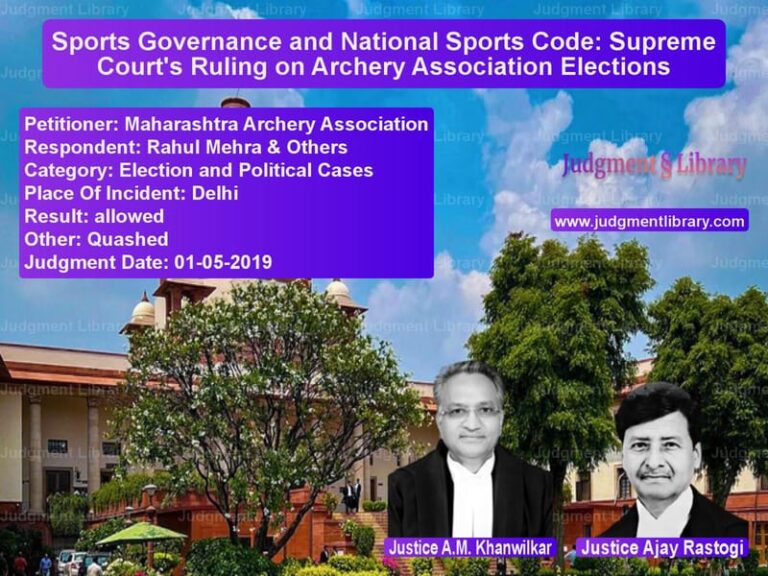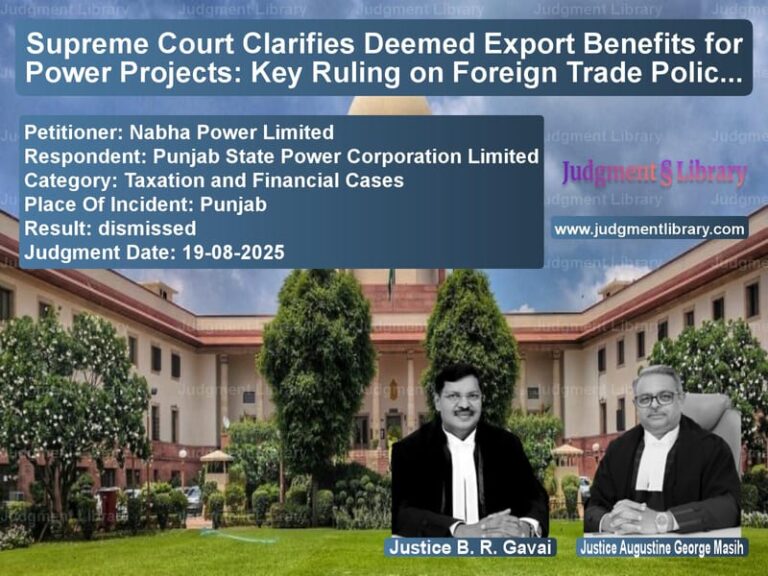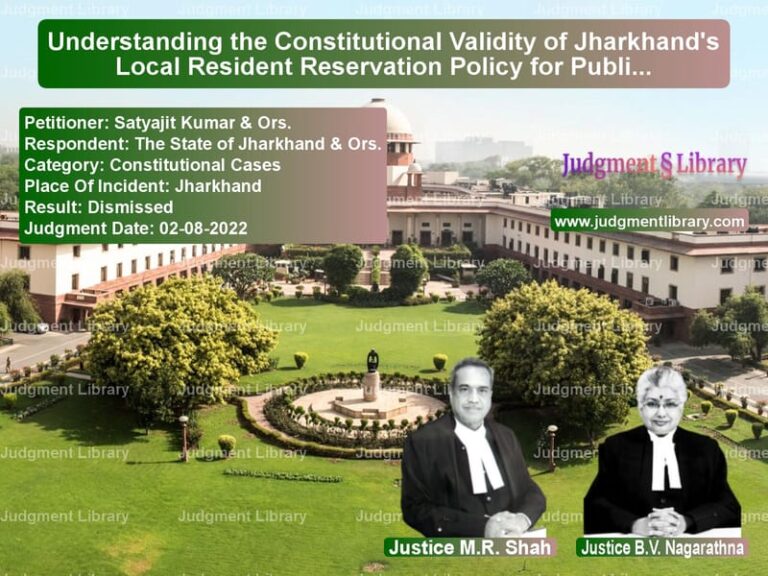Murder Conviction Overturned: Supreme Court Acquits Man Accused of Poisoning
The case of Hariprasad @ Kishan Sahu vs. State of Chhattisgarh revolves around the alleged murder of Bisahu Singh by poisoning. The Supreme Court carefully reviewed the evidence, considering inconsistencies and procedural lapses, and ultimately overturned the conviction under Section 302 IPC, acquitting the accused.
Background of the Case
The case dates back to July 22, 2003, when the deceased, Bisahu Singh, went to the forest to collect wood but did not return home that night. The following morning, his wife found him lying in their house’s verandah in a semi-conscious state, emitting a pungent smell of liquor. When asked, he allegedly stated that the accused, Hariprasad, had invited him for drinks and mixed some herbs in his liquor.
Despite efforts to revive him, his condition deteriorated, and he was taken to CIMS Bilaspur Hospital, where he passed away on July 23, 2003. Initially, the police recorded the case as an unnatural death, but after receiving the forensic report a year later, an FIR was registered on November 3, 2004, charging the accused with murder.
Read also: https://judgmentlibrary.com/supreme-court-revises-conviction-in-rajasthan-murder-case-key-takeaways/
Petitioner’s Arguments
The appellant, Hariprasad, contended:
- The FIR was registered more than a year after the incident, raising doubts about the credibility of the prosecution’s case.
- There was no direct evidence linking him to the alleged poisoning.
- The chemical examiner’s report indicated the presence of Organophosphorus pesticide and Quinolphos in the deceased’s body, but no evidence showed that he administered the poison.
- The so-called dying declaration was weak and unreliable, as it was made to close family members, who could have been biased.
- There was no proof that he possessed the poison or had the opportunity to administer it.
Respondent’s Arguments
The State of Chhattisgarh, representing the prosecution, countered:
- The deceased’s statements to his wife and daughter before dying established the guilt of the accused.
- The forensic report confirmed that the victim died of poisoning, which was allegedly administered by Hariprasad.
- The trial court and high court had both found the accused guilty based on circumstantial evidence.
Key Legal Issues Considered
1. Delay in FIR Registration
The Supreme Court examined whether the delay of over a year in registering the FIR weakened the prosecution’s case. While delays are not always fatal, the Court noted that in this case, it raised serious concerns about the reliability of the evidence.
2. Reliability of the Dying Declaration
The Court analyzed whether the alleged statement of the deceased could be relied upon as a valid dying declaration. The Court held that statements made to family members, without corroborative evidence, could not be the sole basis for conviction.
Read also: https://judgmentlibrary.com/supreme-court-restores-bail-of-purushothaman-high-courts-order-quashed/
3. Proof of Administration of Poison
The prosecution was required to establish:
- The accused had a motive to poison the deceased.
- The deceased died due to poisoning.
- The accused had possession of the poison.
- The accused had the opportunity to administer it.
The Court found that none of these elements were conclusively proven.
Supreme Court’s Verdict
The Supreme Court ruled in favor of the appellant, making the following observations:
- The delay in registering the FIR was unexplained and cast doubt on the prosecution’s version of events.
- The dying declaration was unreliable as it was not recorded by a magistrate and was given to interested witnesses.
- There was no direct evidence proving that the accused had poisoned the deceased.
- The chemical examination report was not presented to the accused under Section 313 CrPC, violating his right to a fair trial.
The Court held:
“In the absence of clear and convincing evidence proving the guilt of the accused beyond a reasonable doubt, we find it unsafe to sustain the conviction.”
Accordingly, the Court set aside the conviction and acquitted the accused.
Key Takeaways from the Judgment
- Delayed FIRs Weaken Prosecution Cases: An unexplained delay in filing an FIR can cast doubt on the authenticity of the case.
- Dying Declarations Must Be Carefully Evaluated: Statements made to family members without independent corroboration cannot be the sole basis for conviction.
- Burden of Proof Rests on the Prosecution: The state must prove every element of the crime beyond reasonable doubt.
- Judicial Scrutiny of Circumstantial Evidence: The Supreme Court reiterated that circumstantial evidence must be strong enough to rule out any possibility of innocence.
This ruling highlights the importance of due process and fair trial principles in criminal cases, ensuring that no individual is convicted based on weak or circumstantial evidence alone.
Petitioner Name: Hariprasad @ Kishan Sahu.Respondent Name: State of Chhattisgarh.Judgment By: Justice Bela M. Trivedi, Justice Dipankar Datta.Place Of Incident: Bilaspur, Chhattisgarh.Judgment Date: 07-11-2023.
Don’t miss out on the full details! Download the complete judgment in PDF format below and gain valuable insights instantly!
Download Judgment: hariprasad-@-kishan-vs-state-of-chhattisgar-supreme-court-of-india-judgment-dated-07-11-2023.pdf
Directly Download Judgment: Directly download this Judgment
See all petitions in Murder Cases
See all petitions in Judgment by Bela M. Trivedi
See all petitions in Judgment by Dipankar Datta
See all petitions in allowed
See all petitions in Quashed
See all petitions in supreme court of India judgments November 2023
See all petitions in 2023 judgments
See all posts in Criminal Cases Category
See all allowed petitions in Criminal Cases Category
See all Dismissed petitions in Criminal Cases Category
See all partially allowed petitions in Criminal Cases Category







